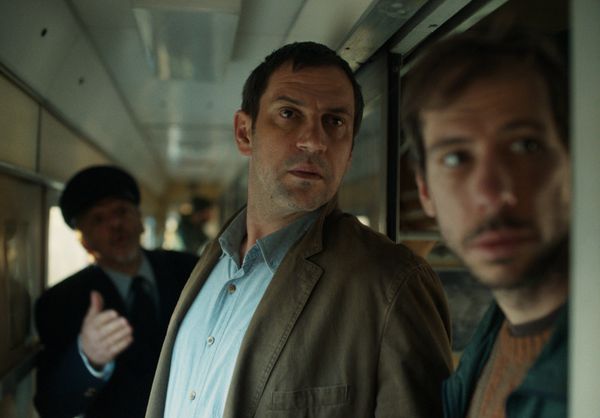Eye For Film >> Movies >> The Man Who Could Not Remain Silent (2024) Film Review
The Man Who Could Not Remain Silent
Reviewed by: Jennie Kermode

It’s 1993, and a train is travelling through Bosnia and Herzegovina. As the credits roll, before we see anything, we hear it rumbling, hear that familiar cacophony of grinding noises, clanks and clicks, hisses and screeches, gradually growing louder. Dragan (Goran Bogdan) is sleeping. He doesn’t take in his surroundings until he awakens, and we awaken with him.
There’s a woman in the train car with a young girl and, across from her, an old man who might be the child’s grandfather. The girl is reading a book which she continues to try to focus on as we hear the sounds of people getting up and moving around. The other two men in the car – one young and thin, one older and smartly dressed but, at this stage, barely seen – stay where they are, but there is chatter. have we reached the station yet? No. This must be some small village station along the way. There is nothing but countryside to be seen. Dragan gets up, steps outside the car into the corridor to see what has happened. A military vehicle has pulled up alongside the train. Soldiers are boarding. They start demanding ID.

Cinema has taught us to imagine ourselves into these spaces in one of two positions: as a potential victim, desperate not to be discovered, or as a hero who steps up and presents some form of resistance. Dragan does not seem to feel personally threatened so it’s easy to cast him, with his vague resemblance to Harrison Ford, in the latter role. When he learns that the young man in his train car, Milan (Silvio Mumelas), has no documents, he reassures him, tells him that they won’t let anybody be taken away. When a soldier enters the car, he speaks up, demanding to know on whose authority this is happening. But what follows does not go according to the usual script, and the result is a film that encourages us to look a little more deeply at ourselves.
Nebojsa Slijepcevic won the Short film Palme d’Or at Cannes 2024 for this film. it is consequently part of the 2025 Oscar race, and it could not feel more timely. What really impresses is its delicacy. Its power stems not from grand gestures but from the smallest of things. The way Milan, afraid for his life, pulls a flimsy curtain across the entrance to the car, the only shield he has. The way Dragan’s fingers tremble as he lifts a cigarette to his mouth. The mother’s attempts to keep the child looking at her book, and the child’s pretence of ignorance, maintained to comfort the mother. All these instinctive behaviours and social signals layered with meaning, all the different mechanisms brought into play in defence of normality. They are brilliantly observed in the cold, clear light, before the train rumbles away again.
Reviewed on: 17 Nov 2024
















